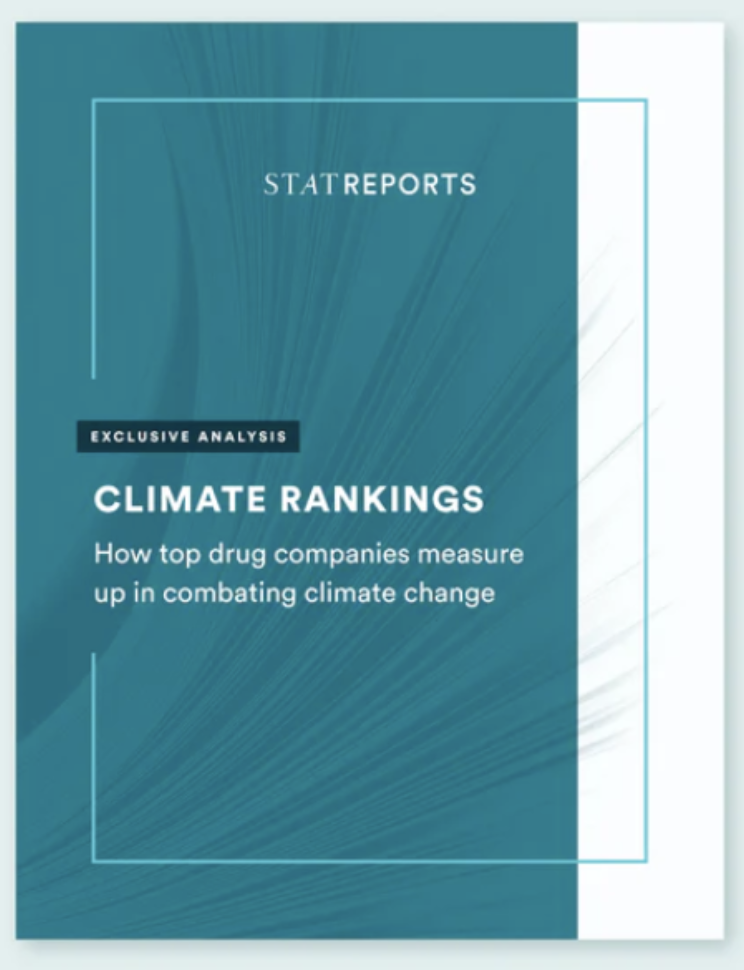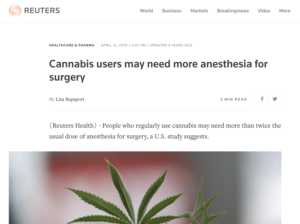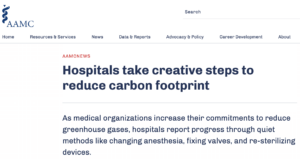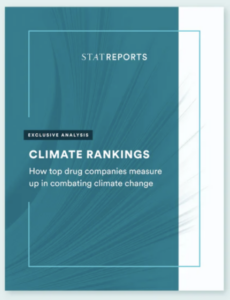Climate Rankings: How top drug companies measure up in combating climate change
This exclusive report is the first comprehensive guide to how biotech and pharma companies are combating climate change, ranking them on their efforts to understand and reduce their greenhouse gas emissions. Based on data compiled from a variety of public sources, STAT conducted an exclusive analysis, using 20 different metrics to rate companies on transparency, credibility, scope, and implementation of climate policies.
Pharmaceutical and biotech companies are major contributors to climate change, through direct emissions and also through their supply and value chains. But the drug industry has trailed far behind in tracking its carbon footprint, much less trying to reduce it.
That’s changing as companies are coming under increasing pressure to take action on climate change from investors and other stakeholders, including government regulators, customers, and their own employees.
There’s been no easy way, however, to find out what individual companies are doing — if they’re doing anything at all.
Until now.
In the report, you will:
- Gain an understanding of the pharma and biotech industries’ contribution to climate change and what the challenges are to measuring and reporting emissions.
- Explore how more than 30 companies are ranked, along with detailed data about their climate efforts and how we evaluated them, and why a majority of the 100 top companies are not doing anything at all.
- Learn what steps some companies are taking to address global warming, who is directing those efforts, and how companies that want to take action can begin doing so.
Additionally, a free spreadsheet with the full data for all 33 companies will accompany this report as an added bonus.
Statistician Dr. William M. Briggs comments: My favorite headline of late is from Stat, which I’ll reveal in a brief moment. First, as I was discovering that headline, I saw the site’s top crawl, which asked us to buy their stunning new report “See how top drug companies rank in fighting climate change.”Only $499! United State dollars. There is no typo. Four hundred ninety nine. Dollars. To learn how drug companies are “fighting climate change.”Drug companies? Fighting “climate change”? You mean there’s a pill for that? Ask your doctor if Kimaatstop&tm; is right for you?
#
Related:
Morano: ‘Your Doctor will treat the climate first — & you will be happy’
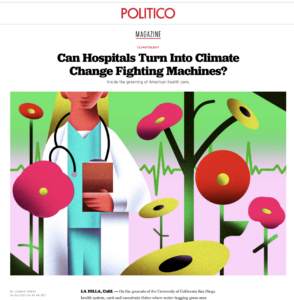
Watch: Morano on OAN TV on hospitals being blinded by this 'insane climate ideology’ –
‘We’ve reached peak madness, were at the end stages of the US Empire’ https://t.co/Li810VwJYc pic.twitter.com/YO18ZE9SmP
— Marc Morano (@ClimateDepot) June 25, 2023
Anesthesia the next target in climate battle: Docs suggest reducing anesthesia: Would you suffer to combat climate change?
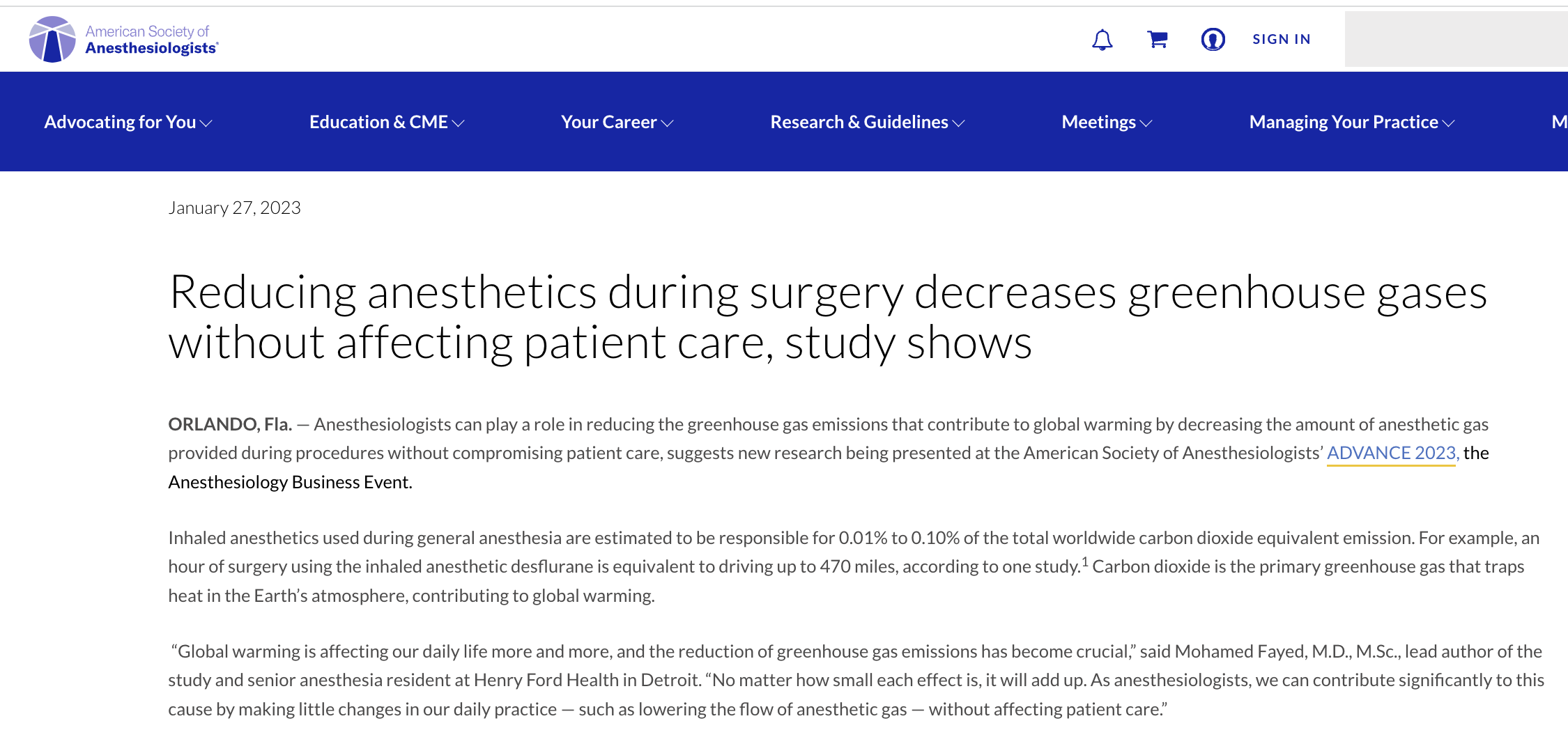
NY Post: Dr. Mohamed Fayed, a senior anesthetist at Detroit’s Henry Ford Health, made the suggestion during the American Society of Anesthesiologists’ annual conference last Friday in Orlando, Florida. “Global warming is affecting our daily life more and more, and the reduction of greenhouse gas emissions has become crucial,” he said. Dr. Fayed added, “No matter how small each effect is, it will add up. As anesthesiologists, we can contribute significantly to this cause by making little changes in our daily practice — such as lowering the flow of anesthetic gas — without affecting patient care.”
Study press release:“Anesthesiologists can play a role in reducing the greenhouse gas emissions that contribute to global warming by decreasing the amount of anesthetic gas provided during procedures without compromising patient care, suggests new research being presented at the American Society of Anesthesiologists’ ADVANCE 2023, the Anesthesiology Business Event.” [Climate Depot Note: The American Society of Anesthesiologists’ website appears to have pulled the article. but it is available here. & here.]
Research notes that inhaled anesthesia accounts for up to 0.1% of the world’s carbon emissions, which are regarded as the primary driver of global climate change. An hour of surgery using an inhaled anesthetic is equivalent to driving as many as 470 miles, according to a 2010 study.
#
Flashback 2020 Study in American Cancer Society Journal in 2020 Fretted over ‘carbon footprint of cancer care’ – ACS Journal: “Climate change and cancer” – Excerpt: “To date, no studies have estimated the carbon footprint of cancer care…The energy expenditure associated with operating cancer treatment facilities and medical devices, as well as the manufacturing, packaging, and shipment of devices and pharmaceuticals, contributes significantly to greenhouse gas emissions in cancer care…Some cancer treatment facilities have begun to consider their own carbon footprint and started a process to achieve carbon neutrality.”
Climate Depot’s Morano: “Here is a question for the American Cancer Society: If you need cancer treatment, would you go to a cancer treatment center that was worried about its carbon footprint? Or one that was worried about delivering the best possible modern care possible?”
#
How many can they come up with? Surgery Causes Global Warming?! Study Shows ‘Anesthesia Agent Is Greatest Potential Contributor to Global Warming’ – Claim: ‘Anesthetics used by a busy hospital contribute as much to global warming as the emissions from hundreds of cars per year’
Restrict anesthesia to save climate & Harvard Med to ‘Integrate Climate’ Into M.D. Curriculum & American Cancer Society Frets ‘carbon footprint of cancer care’ – The Great Medical Reset: Your Doctor will treat the climate first — not your well-being — and you will be happy. Doctors care more about planetary care than patient care.
Climate Depot’s Marc Morano on Addison Smith’s In Focus on One America TV – Broadcast Feb. 8, 2022.
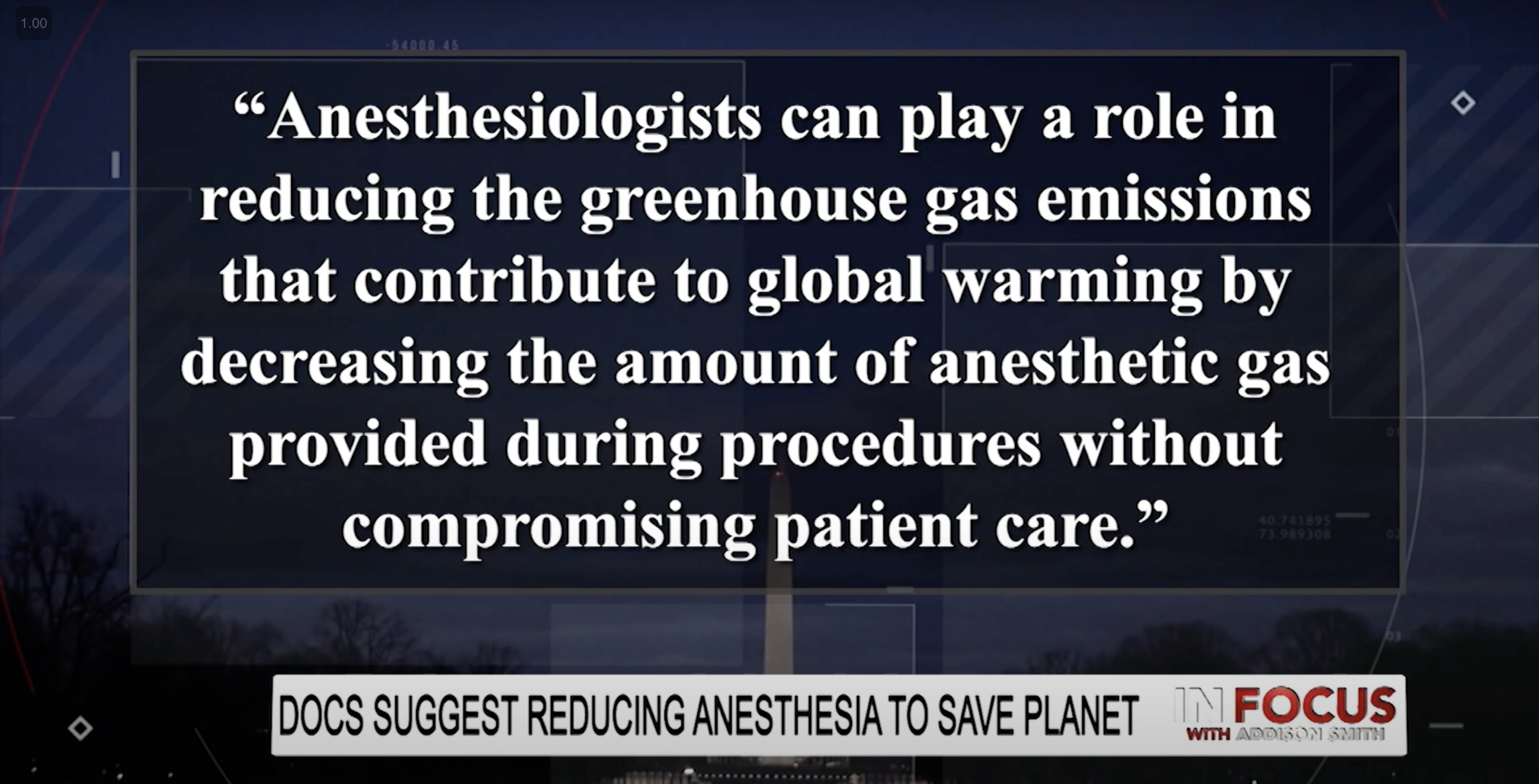 .
. 
 .
. 
Reuters: Cannabis users may need ‘more than TWICE usual dose’ of anesthesia for surgery – “People who regularly use cannabis may need more than twice the usual dose of anesthesia for surgery, a U.S. study suggests.”
Claim: Surgical General Anesthetic is Contributing to Climate Change– Switching from general to regional anaesthetics may help cut greenhouse emissions and ultimately help reduce global warming, a new study claims. While regional anaesthetics numb a certain part of the body, general anaesthetics make patients totally unconscious for what tend to be more serious procedures. But unlike regional anaesthetics, generals use volatile and environmentally-unfriendly halogenated agents, such as desflurane, or nitrous oxide. … ‘Green-gional’ anesthesia: the non-polluting benefits of regional anesthesia to decrease greenhouse gases and attenuate climate change
#How many can they come up with? Surgery Causes Global Warming?! Study Shows ‘Anesthesia Agent Is Greatest Potential Contributor to Global Warming’– Claim: ‘Anesthetics used by a busy hospital contribute as much to global warming as the emissions from hundreds of cars per year’-
Claim: Surgical General Anesthetic is Contributing to Climate Change– Switching from general to regional anaesthetics may help cut greenhouse emissions and ultimately help reduce global warming, a new study claims. While regional anaesthetics numb a certain part of the body, general anaesthetics make patients totally unconscious for what tend to be more serious procedures. But unlike regional anaesthetics, generals use volatile and environmentally-unfriendly halogenated agents, such as desflurane, or nitrous oxide. … ‘Green-gional’ anesthesia: the non-polluting benefits of regional anesthesia to decrease greenhouse gases and attenuate climate change
Flashback 2019: Canadian Medical Association Journal: How health care contributes to climate change – Climate change is a growing health threat around the world — contributing to heat stroke, food insecurity, cardiorespiratory ailments and many other issues — and the health care industry is part of the problem. “It’s almost like the process of healing causes harm,” said Kent Waddington, cofounder of the Canadian Coalition for Green Health Care. Health care in Canada was responsible for 4.6% of national greenhouse gas emissions in 2009–2015, according to a recent study in PLOS Medicine. … The Canadian Coalition for Green Health Care has led projects to reduce the environmental impact of providing health care, such as promoting sustainable food in hospitals and reducing toxic chemicals used for cleaning.
2022: Operating rooms are the climate change contributor no one’s talking about – Two surgeons-in-training suggest some sustainable solutions for their energy-intensive discipline. ... Cancer care is an obvious target for greener efforts within surgery, Berlin notes, because it often involves intense levels of care over a short period of time. Plus, minimally invasive surgeries that require a lot of energy, including robotic-assisted operations, have become common treatments for cancers ranging from colorectal and uterine cancer to head and neck cancer. A robotic-assisted hysterectomy, for example, produces as much carbon as driving more than 2,200 miles in a car — the equivalent of a road trip from Ann Arbor, Mich., to Los Angeles. … Cancer care is an obvious target for greener efforts within surgery, Berlin notes, because it often involves intense levels of care over a short period of time. But perhaps the broadest way the oncology space could cut down on its greenhouse gas emissions is to change how surgical care is delivered, starting with permanently offering telemedicine.
2022: Association of American Medical Colleges: Hospitals take creative steps to reduce carbon footprint – As medical organizations increase their commitments to reduce greenhouse gases, hospitals report progress through quiet methods like changing anesthesia, fixing valves, and re-sterilizing devices.
Linnea Lueken: “Recommends that hospital staff mitigate this alleged danger, primarily by using less anesthesia, or opting for the use of less effective topical or more dangerous intravenous methods because “they have less of a negative environmental impact.” …. Doctors don’t use anesthesia for fun, they do it to reduce pain during medical procedures. These misanthropic M.D.s are advocating nothing more nor less than allowing people to suffer in the name of sustainability. …
We have protocols in place to limit medical tests on human subjects without their consent. Hospitals should be devoted to healing patients, not experimenting in loony sustainability projects on captive subjects.”

